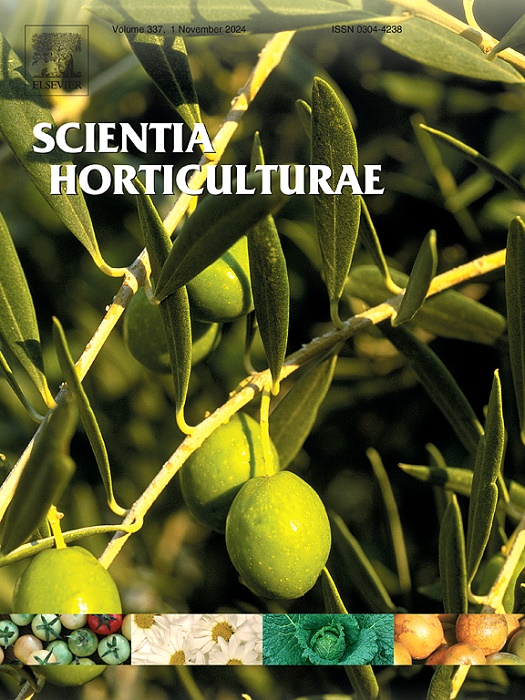茉莉酸甲酯脂质体对 "Kluai Khai "香蕉(Musa AA)在室温储存期间的品质保持和氧化反应缓解的功效
IF 3.9
2区 农林科学
Q1 HORTICULTURE
引用次数: 0
摘要
香蕉在常温储存过程中会迅速加速成熟,这是限制其货架期的一个主要因素。施用茉莉酸甲酯(MeJA)已被用于提高易腐商品的收获后质量。本研究旨在调查封装在脂质体(MeJA-liposomes)中的 MeJA(10-3 M)在室温(26 ± 2 °C)下贮藏 9 d 期间对'Kluai Khai'香蕉(Musa AA)收获后质量的影响。 MeJA-liposomes 的平均粒径为 152.37 ± 1.63 nm,PDI 为 0.21,zeta 电位值为 -33.9 ± 1.02 mV。与 MeJA(10-3 M)、空白脂质体和对照处理相比,MeJA-脂质体处理的果实成熟和果皮显色延迟程度更大。MeJA 脂质体通过降低电解质渗漏、脂氧合酶活性以及果皮中丙二醛、α-茴香烯、共轭三烯(CT-281)和 H2O2 的水平,减轻了果皮的氧化应激。与 MeJA 脂质体处理的香蕉相比,未经处理的香蕉在成熟过程中表现出更高的抗氧化活性,即果皮中的铁还原抗氧化能力和 DPPH 自由基清除活性。应用 MeJA-脂质体处理香蕉可推迟软化过程,并在整个储存期间提高香蕉果肉中的总可溶性固形物含量和 BrimA 含量。总之,MeJA-脂质体的应用为推迟香蕉的成熟过程、减轻果皮的氧化反应和延长 "Kluai Khai "香蕉(Musa AA)在室温下的货架期提供了一种可行的方法。本文章由计算机程序翻译,如有差异,请以英文原文为准。

Efficacy of methyl jasmonate-liposomes on 'Kluai Khai' bananas (Musa AA) quality preservation and oxidative response alleviation during room temperature storage
The rapid acceleration of ripening during ambient storage is a primary factor limiting the shelf-life of bananas. Application of methyl jasmonate (MeJA) has been used to enhance the postharvest quality of perishable commodities. This study aimed to investigate the efficacy of MeJA (10−3 M) encapsulated in liposomes (MeJA-liposomes) on the postharvest quality of ‘Kluai Khai’ bananas (Musa AA) during storage at room temperature (26 ± 2 °C) for 9 d The MeJA-liposomes exhibited an average particle size of 152.37 ± 1.63 nm with a PDI of 0.21 and a zeta potential value of -33.9 ± 1.02 mV. The MeJA-liposomes treatment exhibited a greater delay in fruit ripening and peel colour development compared to the MeJA (10−3 M), blank-liposomes, and control treatments, respectively. MeJA-liposomes reduced the oxidative stress of the peel by decreasing electrolyte leakage, lipoxygenase activity, and the levels of malondialdehyde, α-fanesene, conjugated triene (CT-281) and H2O2 in the fruit peel. As the ripening process in untreated bananas progressed, they exhibited greater antioxidant activities, namely in terms of ferric reduction antioxidant capacity and DPPH radical scavenging activity in the peel, compared to the MeJA-liposome-treated bananas. The application of MeJA-liposomes treatment resulted in a postponement in the process of softening and an increase in the levels of total soluble solids content, and BrimA in the banana pulp throughout the storage period. In conclusion, the application of MeJA-liposomes presents a promising method for postponing the ripening process, alleviating the oxidative response in the peel and prolonging the shelf-life of ‘Kluai Khai’ bananas (Musa AA) at room temperature.
求助全文
通过发布文献求助,成功后即可免费获取论文全文。
去求助
来源期刊

Scientia Horticulturae
农林科学-园艺
CiteScore
8.60
自引率
4.70%
发文量
796
审稿时长
47 days
期刊介绍:
Scientia Horticulturae is an international journal publishing research related to horticultural crops. Articles in the journal deal with open or protected production of vegetables, fruits, edible fungi and ornamentals under temperate, subtropical and tropical conditions. Papers in related areas (biochemistry, micropropagation, soil science, plant breeding, plant physiology, phytopathology, etc.) are considered, if they contain information of direct significance to horticulture. Papers on the technical aspects of horticulture (engineering, crop processing, storage, transport etc.) are accepted for publication only if they relate directly to the living product. In the case of plantation crops, those yielding a product that may be used fresh (e.g. tropical vegetables, citrus, bananas, and other fruits) will be considered, while those papers describing the processing of the product (e.g. rubber, tobacco, and quinine) will not. The scope of the journal includes all horticultural crops but does not include speciality crops such as, medicinal crops or forestry crops, such as bamboo. Basic molecular studies without any direct application in horticulture will not be considered for this journal.
 求助内容:
求助内容: 应助结果提醒方式:
应助结果提醒方式:


